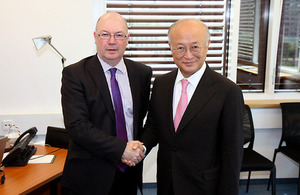"Nuclear security demands collective global action"
Alistair Burt delivers the UK Statement to the International Atomic Energy Agency conference on nuclear security, Vienna, Austria

Foreign Office Minister Alistair Burt meeting International Atomic Energy Agency Director General Yukiya Amano
Alistair Burt MP - Statement to the IAEA Nuclear Security Conference, Vienna, 1 July 2013
Nuclear security is at the top of each of our national agendas, but it is an issue that demands collective and complementary global action – which is why I am pleased to be here today. I am grateful to Director General Amano for the opportunity to address this audience.
The International Atomic Energy Agency plays a critical role in strengthening the global nuclear security system, and the UK remains committed to supporting its work.
UK support to the IAEA
The significance of the IAEA’s work can be seen through the activities of the Office of Nuclear Security: enhancing the protection of highly sensitive nuclear and radiological material and sites; and providing high quality nuclear security training and advice to officials from many countries.
This is something the UK works with the IAEA to deliver – through its Global Threat Reduction Programme – in regions such as the Former Soviet Union, Asia, and sub-Saharan Africa. The International Nuclear Security Education Network has also been effective in developing and sharing nuclear security teaching material amongst its members.
To support the Office of Nuclear Security carrying out its work to ensure that nuclear sites are properly protected, the UK makes regular contributions to the Nuclear Security Fund, and we would urge other Member States to do the same. The UK provided £3 million this year, bringing our total contribution since 2011 to £9 million. We are grateful to the IAEA for its efforts to ensure these contributions are used effectively – not least through the reform of its bureaucracy.
UK support for nuclear security instruments
We share the IAEA’s commitment to supporting the implementation of important multilateral instruments, including the Amendment to the Convention on the Physical Protection on Nuclear Material.
Under our 2013 Chairmanship, the G8 Non Proliferation Directors Group has issued demarches to those States that are Parties to the Convention, but that have not yet ratified its Amendment. We have also undertaken a number of outreach activities – for example, we supported an event in Senegal last month to improve understanding of the legislative framework necessary to ratify this instrument.
Once the amended Convention is in force, Parties will need to assure the international community of its implementation. I am pleased to announce that last week the UK deposited with the IAEA an updated report outlining the UK laws and regulations which give effect to the Convention and its 2005 Amendment. We would encourage all Parties to the Amendment that have not deposited a report with the IAEA to do so.
In addition to work in support of the amended Convention, the G8 Non Proliferation Directors Group has demarched States that have not yet issued a first report, in accordance with UN Security Council Resolution 1540. The UK will publish an updated National Implementation Plan later this year. UK and international collaboration
The UK continues to work closely with international partners on both strengthening the global nuclear security architecture, and on nuclear security issues more broadly.
As Chair of the Global Partnership Working Group this year, the UK is promoting international cooperation in a very practical way – bringing together Partnership members with project ideas and those with resources and expertise to encourage collaboration.
Further partnerships could be achieved if States with an IAEA Integrated Nuclear Security Support Plan (INSSP) requiring assistance would authorise the release of relevant parts of their Plan. This would allow the IAEA and international partners to ensure that resources are used in a coordinated and targeted way.
UK Domestic Nuclear Security
The UK takes its domestic nuclear security very seriously. Indeed, we were the first Nuclear Weapons State to host an International Physical Protection Advisory Service mission, in 2011.
Following this, the Office for Nuclear Regulation issued new security guidance to the civil nuclear industry in a move described as a ‘new chapter’ for the industry. It shifts the onus onto operators to demonstrate to the Regulator how their security arrangements meet the required objectives. This mirrors the approach that has been adopted regarding nuclear safety and is expect to help to embed a positive and professional security culture across the civil nuclear sector.
This is important, because changes in nuclear security culture have lagged behind the considerable improvements we have seen in the physical security of nuclear and radiological sites. At the Nuclear Security Summit, 2012, the UK pioneered a new Multinational Statement on Information Security.
We have also introduced a requirement for security measures to be in place at civil nuclear sites from the moment where construction begins, rather than the point at which they become operational, and will elevate the Office for Nuclear Regulation to a statutory footing from April next year.
The future
As we look forward to the Nuclear Security Summits for 2014 and 2016 an opportunity exists for the IAEA to take on a greater role in the development of the international nuclear security framework. The UK will continue to support the IAEA in forwarding this goal